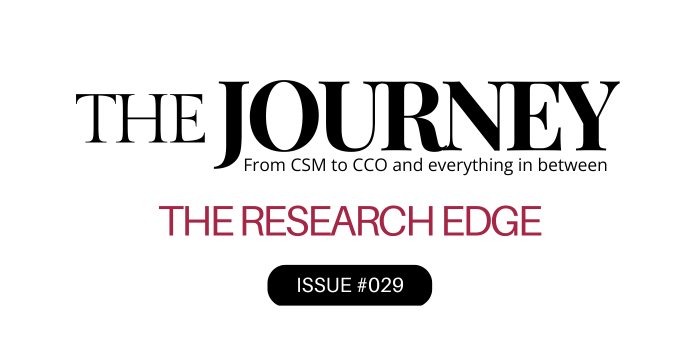The Journey: #29 The Research Edge
- Kristi Faltorusso

- Jul 22, 2025
- 3 min read

When I started my first role in Customer Success, I thought I had it all figured out.
I had been a power user of the product.I knew the platform inside and out.I had run real programs as a practitioner and subject matter expert (SME).I was the success story.
So when I became a CSM, I thought I already had the blueprint. I knew what worked. I knew what good looked like. I assumed my job was to show up and show others how to follow suit.
And then… I had my first onsite with a large insurance customer.
I came in hot with recommendations, templates, best practices, you name it.I thought I was adding a ton of value.But they sat across from me, listened politely, and replied:
“That won’t work for us.”
I was shocked.Honestly? I was embarrassed.
I knew what I knew.But I didn’t know what I didn’t know.
I hadn’t done the work to understand them, their industry, their policies, their regulatory challenges, their internal politics, or even their competitors. I was trying to lead with experience, but not with insight.
Lesson learned.That experience changed everything for me.
I started digging in. I researched everything.Their market. Their use cases. Their challenges.And that’s when I really started helping.
Research isn’t a phase of work. It’s a skill. A posture.And in Customer Success, it’s one of the most underutilized levers we have.
Here are 6 ways research will help you succeed, internally, externally, and professionally:
1. Customer Deep Dives
Why it matters: No more generic recommendations. Tailored insight builds trust.
What to research:
Recent org changes, funding rounds, or acquisitions
Their customer base and revenue model
Business goals and strategic initiatives
Impact: You’ll earn credibility faster and show that you care enough to do your homework.
2. Market and Industry Trends
Why it matters: Context is everything. Industry shifts can change customer priorities overnight.
What to research:
Regulatory shifts, new entrants, or economic pressure
Benchmarks and best practices across their vertical
The language their execs are speaking
Impact: You'll connect your product to what actually matters in their world.
3. Competitive Landscape
Why it matters: It’s not just about how good you are, it’s about what you’re being compared to.
What to research:
Who their alternatives are
Key differentiators and pricing models
What customers are saying on G2 and Reddit
Impact: You’ll position your product more strategically and protect your renewals.
4. Pain Points and Use Cases
Why it matters: Customers don’t buy products. They buy solutions to their problems.
What to research:
Common roadblocks in implementation
Use case trends by segment or persona
Success stories to back up recommendations
Impact: You'll anticipate needs and tee up the right outcomes before they even ask.
5. Your Own Career
Why it matters: Growth doesn’t happen by accident. You have to be your own advocate.
What to research:
Market rates, equity expectations, and comp bands
What skills top-performing CSMs are building
How others have progressed in their careers
Impact: You’ll negotiate smarter and develop with purpose.
6. The Role of CS Itself
Why it matters: CS is still evolving and so should you.
What to research:
Modern CS org design, KPIs, and AI applications
Revenue influence models and success metrics
What the best CS orgs are doing differently
Impact: You’ll stay relevant and shape your team’s future, rather than reacting to it.
Research doesn’t make you smarter. It makes you sharper.It gives you context, confidence, and credibility.It helps you show up prepared, speak your customer’s language, and make moves that matter.
So whether you're prepping for a call, building a deck, or navigating your next promotion, do the work before the work.And watch what happens next.




Comments